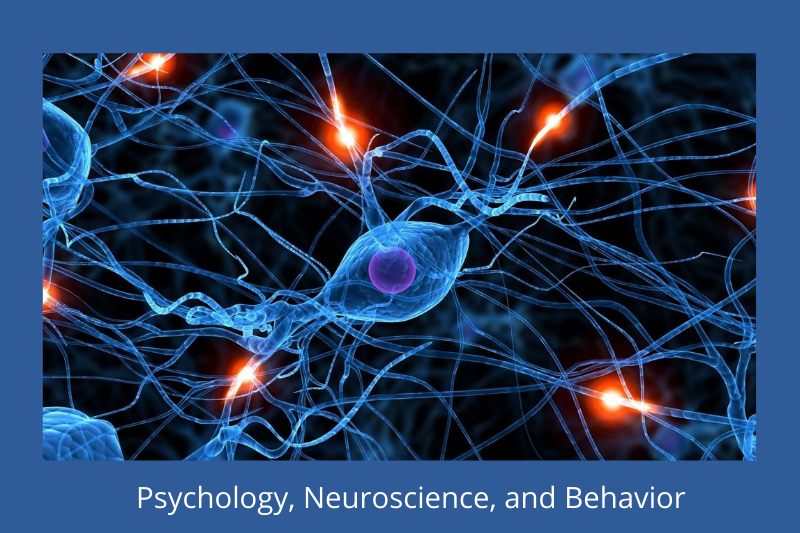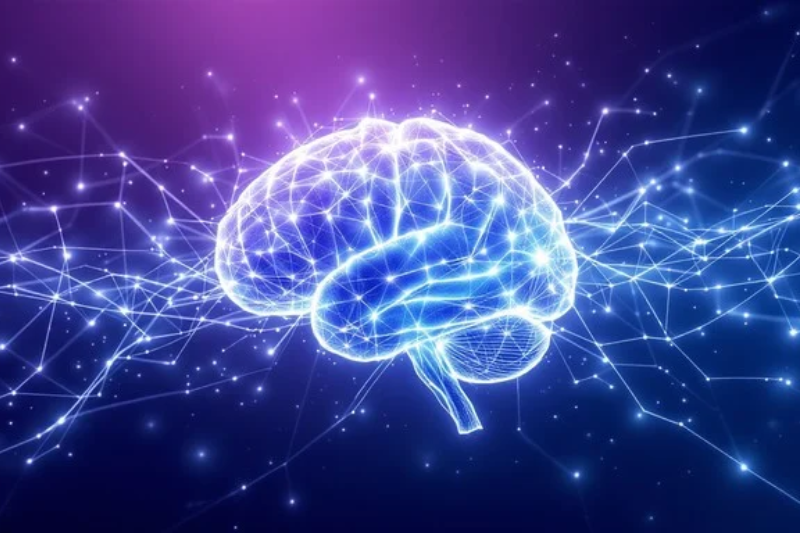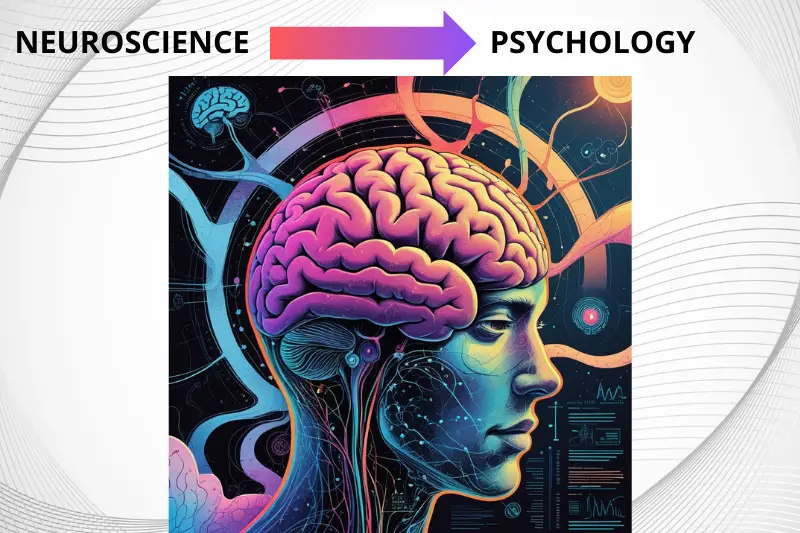The intricate human mind continues to baffle even as continual progress illuminates its mysteries. Each fleeting notion, sensation, memory, and deed arises from the brain’s inscrutable processes. To comprehend how these mechanisms mold the way we feel, think and act, scholars and scientists have cultivated domains like psychology, neuroscience, and behavioral investigation. These three realms are profoundly interwoven, each supplying unique glimpses into human nature. This essay explores psychology, neuroscience, and behavior – what they encompass, how they interact, and why comprehending ourselves and the world around demands an appreciation of them.
What is Psychology?
Psychology is the scientific inspection of the mind and conduct. It envelops a wide panoply including cognition, emotion, perception, personality, mental health, progression, and social engagements. Fundamentally, psychology aims to understand how individuals think, feel, and behave both alone and with others.
Branches of Psychology
Psychology is a diverse field with several offshoots, each centered on specific aspects of human conduct:
Clinical Psychology: Concerns diagnosing and treating mental disease and emotional disturbances.
Cognitive Psychology: Focuses on mental processes for example memory, problem-solving, attention, and language.
Developmental Psychology: Studies how people evolve and change throughout their lives, from infancy to old age.
Social Psychology: Examines how individuals are shaped by social environments and group dynamics.
Educational Psychology: Applies psychological principles to learning and educating.
Industrial-Organizational Psychology: Employs psychological concepts to better workplace productivity and employee welfare.
Health Psychology: Explores how psychological factors impact health and sickness.
Psychologists use both qualitative and quantitative methods, like experiments, observations, surveys, and case studies, to comprehend psychological phenomena.
What is Neuroscience?
Neuroscience is the scientific study of the nervous system, focusing primarily on understanding the biological basis of behavior, thought, and emotion through the complex structures and functions of the brain. It spans multiple disciplines from biology and chemistry to physics and computer science given the intricate nature of neural circuits.
Major Areas of Neuroscience
Cognitive neuroscientists investigate how diverse brain processes support complex cognitive activities such as decision-making, language comprehension, and sustained attention. Those in the field of behavioral neuroscience examine how neurological and biological factors influence observable responses. Neuroanatomists explore the intricate structures throughout the central and peripheral nervous systems. Neurochemists research the various chemicals and neurotransmitters that influence neural communication pathways. Developmental neuroscientists study how the brain alters across various life stages. Clinical specialists seek to comprehend and remedy neurological and psychiatric conditions. Neuroscientists utilize an assortment of approaches including brain imaging techniques, electrophysiology, and molecular biology to uncover the inner workings of the mind.
What is Behavior?
Behavior refers to the observable or internal actions and reactions of an organism, usually human or animal, in response to stimuli within its surrounding environment or internal state. These may be conscious, unconscious, voluntary, or involuntary. Behavior encompasses external demonstrations such as verbal communication or ambulation along with inner processes like dreaming or problem-solving.
Types of Behavior
Innate behaviors are inborn reflexes or instincts. Learned responses are acquired through interactions. Social behaviors are interpersonal exchanges. Emotional behaviors are feeling-driven reactions. Cognitive behaviors are thoughtful mental processes. Behavioral scientists aim to comprehend these actions and the psychological and biological underpinnings that drive them.
The Interconnection Between Psychology, Neuroscience, and Behavior
While psychology, neuroscience, and behavior are complex interrelated disciplines, each one meaningfully contributes to comprehending how the brain and body interface. Psychology furnishes principles and conceptual frameworks to decipher behavior. Behavioral psychology (or behaviorism) solely centers on observable actions and environmental factors that reinforce them. However, cognitive psychology explains behavior through intricate mental processes like notions and outlooks. Neuroscience reveals the inherent biological underpinnings of behavior. It clarifies how neurons, brain structures, and neurotransmitters are involved in everything from fear responses to addiction. For example, the amygdala is known to play a pivotal role in processing emotions for instance fear and hostility. Cognitive neuroscience is a perfect illustration of the fusion between psychology and neuroscience. It investigates how cognitive capacities (studied in psychology) are linked to neural activity (studied in neuroscience). Techniques like fMRI allow researchers to observe brain function while an individual performs a mental job, bridging the space between thought and physiology. Collectively, these fields allow us to comprehend the full image of human behavior. For example, comprehending depression necessitates psychological insight into an individual’s emotional condition, behavioral examination of their daily actions, and neuroscientific data on brain biochemistry and operation.
The integrated analysis of psychology, neuroscience, and behavior has numerous practical usages in everyday life and diverse professional domains. Mental health specialists use insights from all three areas to diagnose and treat conditions such as anxiety, depression, and schizophrenia. For instance, cognitive behavioral therapy (CBT) is a psychological treatment that alters thought patterns to change behavior, while psychiatric medications target neurotransmitter systems to adjust brain function.
Education
While some suggest learning is best fostered through a rigid classroom structure where students absorb information passively, educational psychologists and neuroscientists take a more nuanced view. Through examining how the brain develops and functions, they seek to understand each child’s individual needs and strengths to nurture growth in a holistic manner. Optimal learning is shown to depend not just on academic content alone, but on ensuring children’s basic physiological requirements for focus and retention are also met through nutrition, sleep, movement and creative play.
Criminal Justice
In their pursuit of justice, forensic psychologists delve deep into the complexities of the human psyche. Rather than swift judgement, their analyses aim to gain profound insights into what shaped each criminal mind, what drove each deed, and whether biological or environmental factors contributed to their plight. With care and compassion, they work to discern how society can best rehabilitate lawbreakers to deter repeat offenses and safeguard communities, while also protecting the vulnerable from rash diagnoses.
Business and Marketing
To prosper in cut-throat markets demands understanding not just products and profits, but people. What stirs consumers’ hearts and fires their imaginations? Businesses tap into the subtle workings of the mind through visual cues, emotional triggers and subtle social pressures tested by neuroscience and refined by behavioral research. Yet with privilege comes responsibility, and ethics demand they uplift society not manipulate it for their sole benefit.
Artificial Intelligence
If machines are to serve humanity helpfully rather than harmfully, their creators see wisdom in modeling them after Nature’s finest invention – the thinking, feeling, learning human brain. By reverse-engineering neural circuits and the unfathomable dance of synapses, AI researchers hope to imbue silicon with sentience to benefit all. But will humanity’s stand remain if its creations surpass their forebears in intelligence? Therein lies both promise and peril.
Recent Advances and Emerging Trends
Advancing in lockstep, psychology, neuroscience and their technological tools now reveal humankind to itself as never before. Brain scanning sheds light on cognition’s biochemical babble, while machine learning cracks millennia-old codes of the mind that once baffled our greatest thinkers. Yet more mysteries emerge too, pointing to vistas that may transform our self-understanding and social structures if tread with care, nuance and regard for human dignity. Among the frontiers: neuroplasticity’s lessons for healing and growth; neuroethics’ navigation of conscience in innovation; genetics’ role in shaping lives; and mind-body wellness in an age of disconnection.
Challenges and Ethical Considerations
For all that these fields have illuminated so far, darkness still shrouds vast regions of our inner cosmos. The organ we use to plumb reality’s depths remains a riddle to the problem-solvers it spawned. While knowledge yields power, with it comes duty – to wield insights for bettering all, not exploiting some. Perhaps humanity’s greatest challenge, like Socrates knew, is knowing how little is truly known; our highest ethics, handling what we’ve learned with humility, honesty and care for one another.
Ethics in Research: Experiments involving brain scans, animal testing, or interventions in mental health require the utmost care and oversight to safeguard volunteers and patients.
Reductionism: While certain behaviors can be linked to specific neurological or environmental factors, attributing human actions solely to biology or environment grossly simplifies our nature. An integrated approach acknowledging myriad influences is key.
Conclusion
The fields of psychology, neuroscience, and behavioral science work in concert to illuminate what it means to be human. Psychologists explore the mind and how we think, feel, and act. Neuroscientists unveil the inner workings of our most complex organ, the brain. Behaviorists observe how we respond to and are shaped by our world. Together these disciplines inform all aspects of society, from mental healthcare and education to technology and business.
As scientific progress accelerates, so too will our capacity to comprehend and impact human cognition and conduct. By combining psychological principles, neurological data, and behavioral observations, we pursue not only unlocking the mystery of the brain but bettering life in all its facets through a deeper self-understanding.



